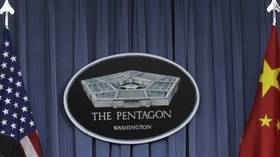Who Lost Afghanistan? H.R.
Congress, the media and many voters are asking military officials this week: how did we lose the Afghan war? I’ve been reading a book, “The Afghanistan Papers,” by Washington Post reporter Craig Whitlock, that shows how America messed up its longest war. (Every now and then, corporate media hypes something that’s actually worth reading.)
What it does not show, and what Pentagon leaders don’t seem to understand, is why.
Whitlock’s book reads like a synopsis of the many essays, books and cartoons I produced over 20 years, which were rejected by most newspapers and news websites because editors and producers refused to publish content that criticized the war.
For instance, Whitlock echoes my longstanding insistence that the Taliban posed no threat to the United States: “The Bush administration made another basic mistake by blurring the lines between Al Qaeda and the Taliban,” he writes. “The two groups shared an extremist religious ideology and a mutual support pact, but pursued different goals and objectives. Al Qaeda was primarily a network of Arabs, not Afghans, with a global presence and outlook… In contrast, the Taliban’s preoccupations were entirely local… The Taliban protected bin Laden and built a strong alliance with Al Qaeda but Afghans did not play a role in the 9/11 hijackings and there is no evidence they had advance knowledge of the attacks.”
We spent 20 years fighting people who meant us no harm and couldn’t have hurt us even if they had wanted to.
While the after-action investigation is necessary and interesting — I’m following it every day — the postmortem necessarily focuses on acts of commission and omission during the war, after it started. Perhaps because both major political parties were equally complicit in the invasion as a knee-jerk response to 9/11, or because both the Democrats and the Republicans are in the pockets of the defense industry, no one is questioning the decision to start the war, only its atrocious execution and embarrassing wind-down.
The sad truth is, the same screwups will continue. We will keep beginning wars against countries we ought to stay away from. We will make the same mistakes throughout the duration of those wars. Nothing will change because nothing has changed.
The reason is simple: personnel. Presidents keep hiring the wrong people to make decisions about war and peace. And the right ones never have a seat at the table in the room where it happens.
Voters who want to avoid fighting another Afghanistan war must insist upon candidates who promise to include anti-interventionists among their top military advisers and in their cabinet. They should withhold their votes from politicians, even liberal Democrats, who refuse to promise to include pacifists, war skeptics and isolationists among their inner circle. Personnel is policy, they say in Washington, and that is never truer than when someone near the President of the United States suggests military action.
Eisenhower was one of the last American political leaders to understand the importance of drawing advice from an ideologically diverse group. “I know of only one way in which you can be sure you’ve done your best to make a wise decision,” Ike said. “This is to get all of the people who have partial and definable responsibility in this particular field, whatever it may be. Get them with their different viewpoints in front of you, and listen to them debate.”
Unfortunately, there’s hardly any debate on whether or not to go to war.
What passed for diversity of opinion in the George W. Bush cabinet was a group of hawks with different styles and proclivities, but hawks nonetheless. After 9/11 Bush’s “war cabinet” included his notoriously bellicose Vice President Dick Cheney, National Security Adviser Condoleezza Rice, Secretary of State and former General Colin Powell, Secretary of Defense Donald Rumsfeld, Chief of Staff Andrew Card, and CIA director George Tenet. No experts on Afghanistan were invited. No academics, no journalists, no one who had even spent a single night in a house in Afghanistan.
Predictably, all the choices discussed involved military action. “The war cabinet considered several options for the U.S. pursuit of Al Qaeda in Afghanistan: a strike with cruise missiles, cruise missiles combined with bomber attacks, or ‘boots on the ground,’ that is U.S. soldiers in Afghanistan,” James P. Pfiffner noted in the journal Issues in Governance Studies. Most Americans now agree that the war was a mistake.
Bush should have stayed out of Afghanistan entirely.
Some people felt that way at the time, when it mattered, before we wasted trillions of dollars and killed hundreds of thousands of innocent people. But antiwar Americans were ridiculed when they weren’t simply being ignored. Bush couldn’t make the right decision because no one who had his ear ever argued for it.
Joe Biden is a different and hopefully better president than George W. Bush, yet his group of advisers suffers from the same lack of ideological diversity. No one who generally opposes war meets with the president on a regular basis. When there’s a foreign policy crisis, none of Biden’s senior advisers can be counted upon to argue against getting involved.
Understanding how we lost Afghanistan is useful.
If we want to understand why we lost Afghanistan, and if we want to stop the next Afghan war before it starts, we should look at who.


